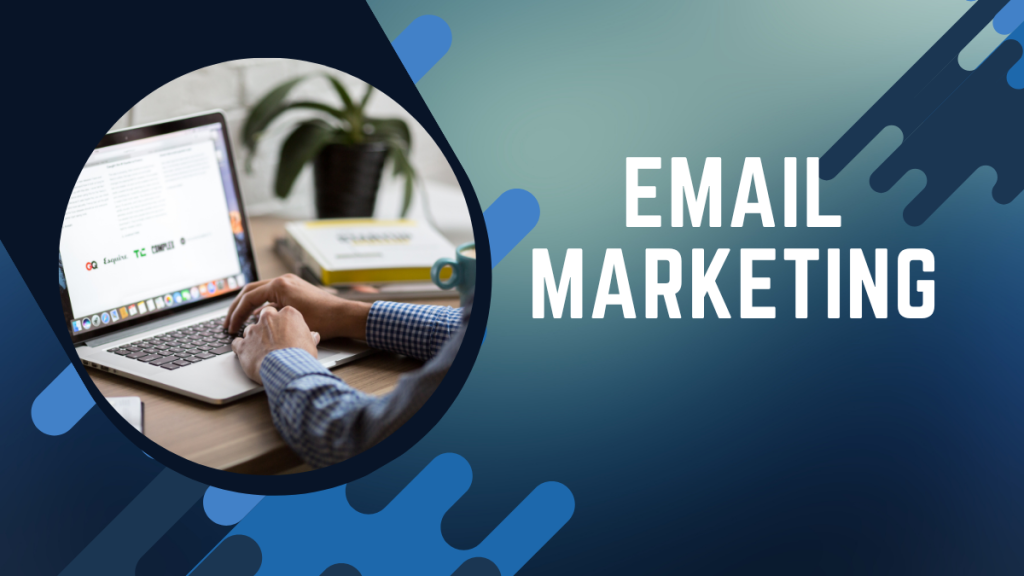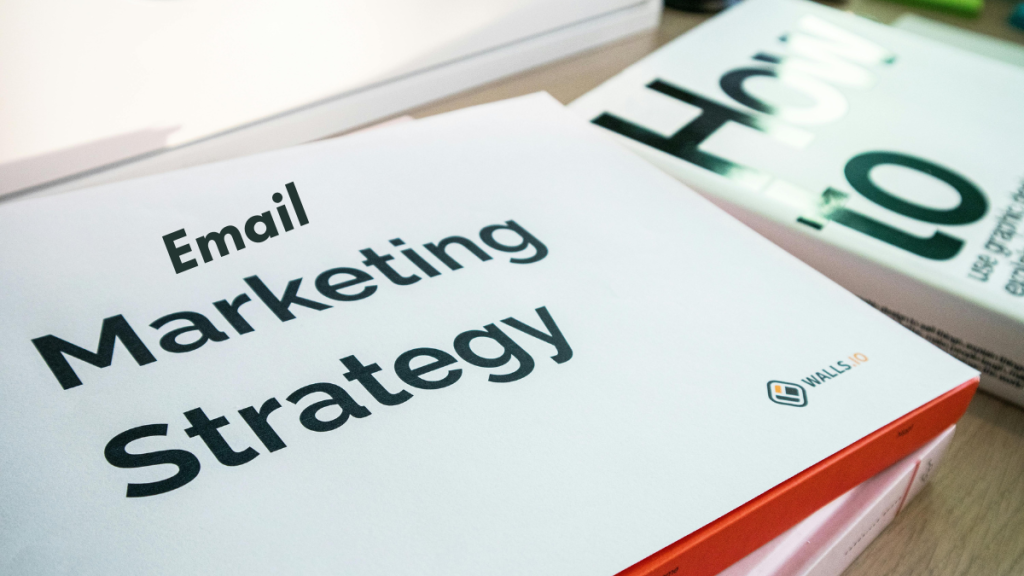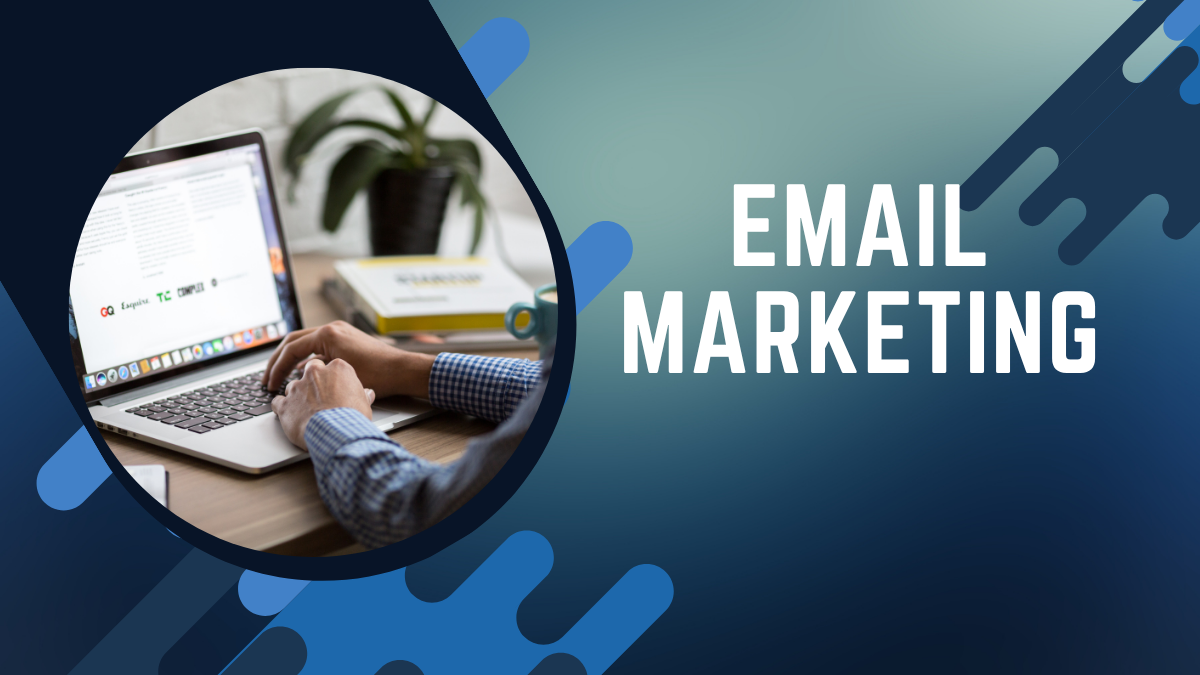I’m sure that if you know just a little bit about digital marketing, you’ve heard the term ’email marketing’, but do you know what it is exactly? If not, let’s find out!

What is Email Marketing?
Email marketing is a form of digital marketing, as well as a type of marketing in general. It is a powerful and impactful marketing channel in which emails are used to promote a business’s services or products.
What does Email Marketing Do?
Email marketing helps you reach existing or potential customers for your product or service. Today, many businesses start with free email marketing tools to launch their initial email campaign before investing in more advanced features or exploring channels like direct mail marketing. In other words, email marketing is about using email to connect with people who might be interested in what you’re offering. If you’re selling digital marketing services or a course, you’ll reach out to potential customers through email and try to persuade them to buy from you. It’s a way to inform them about your latest products, offers, or updates—and to build a relationship that leads to sales.
Email marketing can play a critical role in marketing strategy, specifically with lead generation, brand awareness, building relationships, and much more!
Types of Email Marketing

There’s not one but many types of email marketing. The most common ones are:
Welcome Emails
Welcome emails in email marketing/digital marketing are types of emails that welcome customers and motivate them to learn more about the service or product. Their whole idea is to introduce a potential customer to a new or existing business. Welcome emails are also a very common type of email offered by email marketing service agencies, as they seem to be significantly popular in today’s age. They also often offer a trial and other bonuses to the customer to attract them to a business’s page.
Sub-Domains:
- Welcome Series
- New Subscriber Welcome
- New Customer Welcome
- Trial User Welcome
- Product Tour Welcome
Transactional Emails
These types of emails are automatically sent when someone takes a specific action, like signing up or making a purchase. They’re not meant to sell anything—instead, they help keep customers informed and build trust over time.
Newsletter Emails
Newsletter emails are yet another very popular type of email marketing. They are written to highlight a new product or service. Usually, newsletters include articles, blogs, and even customer reviews. These types of emails also have a call to action, encouraging the customer to take action, whether checking out or exploring a new product/service and even perhaps, reading a blog with detailed information about the product.
Sub Domains
- Content Digest or Blog Roundup Newsletter
- Company News or Updates Newsletter
- Curated Content Newsletter
- Industry News Newsletter
Dedicated Emails
Dedicated emails are emails sent to reach specific groups within your email list, such as the newest customers or those who haven’t purchased anything from you in a while. The concept is to inform or remind the customer about the service or product.
Sub Domains
- Segmented Promotions (specific discounts for specific customer groups)
- Inactive Customer Re-Engagement
- High-Value Customer Exclusives
- Geographic Specific Offers
- Loyalty Program Member Updates
Lead Nurturing Emails
These types of emails are like a ‘friendly drip campaign’ for those who are interested in your products but not ready to buy. They involve a series of emails offering special deals or more information about your product or service, gently guiding the customer towards making a purchase.
Sub Domains
- Educational Series (how to guides related to your product or service)
- Product Demo Series
- Case Study/Testimonial Series
- Free Trial Follow-up Series
- Webinar/Event Follow-up Series
Referral Emails
Ever experienced a business sending out an email saying that if you refer their product, you’ll receive $10 for it? Those are referral emails. Referral emails are written to encourage existing customers to refer new customers to the business, often by offering incentives to the referrer and the new customer.
Confirmation Emails
You might have seen it often that when you bought something online, you got an order confirmation email right away. A confirmation email informs the customer that their action was successful and may even suggest next steps, like exploring other similar products or services.
Sub Domains
- Order Confirmation
- Subscription Confirmation
- Registration Confirmation
- Submission Confirmation
- Account Creation Confirmation
Survey Emails
Survey emails are one of my favorites. They are a core part of a marketing strategy and are sent out to get customer feedback. Survey emails show the customer that they matter and their valuable input can help make the product or service better.
Sub Domains
- Post-purchase Survey
- Customer Satisfaction Survey
- Net Promoter Score Survey
- Feedback Request
- Product/Service Improvement Survey
Promotional Emails
Promotional emails are the most common type of emails in email marketing and in an email marketing strategy. They are typically sent to a large audience, and their role is to ensure the customer remembers the business. So, if you’re sending out a promotional email, you’re trying to ensure that your brand stays in people’s minds and gives them a sneak peek of upcoming products and services.
Sub Domains
- New Product/Service Launch Announcement
- Sale Announcement/Discount Offer
- Flash Sale/Limited-Time Offer
- Product Showcase/Highlight
- Bundle/Package Deal
- Clearance Sale
Invite Emails
These emails are typically sent when there is something new and special going on, such as an upcoming event, a new product launch, or a webinar. They are sent to grab attention and create a sense of excitement among the customers.
Sub Domains
- Webinar Invitation
- Event Invitation (online or in-person)
- New Product Launch Event Invite
- Beta Program Invitation
- Live Q&A Invitation
Seasonal Marketing Emails
Seasonal Marketing Emails are extremely popular types of emails sent around holidays like Valentine’s Day, Christmas, Black Friday, or Mother’s Day. They typically contain information about special offers and promotions related to the occasion, informing the customer that business XYZ is offering these promotions and prompting the customers to explore the promotions for a benefit like mega savings. Seasonal emails also indicate limited-time offers, creating a sense of urgency for the customer to shop right away.
- Holiday Sale (e.g., Christmas, Black Friday, Cyber Monday)
- Seasonal Collection Launch (e.g., Summer Fashion, Winter Gear)
- Special Occasion Offers (e.g., Mother’s Day, Father’s Day, Valentine’s Day)
- End-of-Season Clearance
Abandoned Cart Emails
Abandoned cart emails serve as a reminder for customers who have added items to their online shopping cart but have left the website without completing the purchase. These types of emails are very popular and highly effective in recovering potentially lost sales.
Sub Domains
- Single Reminder Email
- Multi-Email Abandoned Cart Series (e.g., 1st reminder, 2nd with incentive)
- Abandoned Checkout Email (for those who started checkout but didn’t finish)
Re-engagement Emails/Win-back Emails
These emails are sent to the subscribers who have become inactive and the ones who haven’t opened or clicked an email in a while. Their whole purpose is to re-ignite enthusiasm and motivate the customers to engage with the brand again.
Sub Domains
- “We Miss You” Email
- Special Offer to Re-engage
- “What’s New” Update to Re-engage
- Feedback Request (asking why they’re inactive)
- Last Chance to Stay on List
Thank You Emails
Finally, Thank You Emails are a type of email sent to express appreciation for a purchase, a significant milestone such as a customer’s anniversary, or feedback provided. In other words, they are emails that you receive after you have provided feedback to a business’s product or service. Their purpose is to build loyalty rather than be salesy or prompt immediate next action.
Pros and Cons of Email Marketing
| Pros | Cons |
| High ROI | Spam problems |
| Lead generation | Undelivered and unopened emails |
| Inexpensive and low-cost | Extreme competition |
| Helps you get customer feedback | Easy to unsubscribe |
| Additional profitable sales channel | Needs a large audience to convert significant sales |
| Can be automated using software like Mailchimp | Design inconsistency on different devices |
| Excellent personalization opportunity | Copywriting skills required |
| Increases web traffic | |
| Builds relationships and trust | |
| Great for the promotion of products and services | |
| Easy to share | |
| Captures a large audience |
Conclusion

Email marketing is a very popular type of marketing in the digital marketing age. It uses emails to promote businesses, keeping them informed about new products and offers. Least to say, email marketing is a key part of digital marketing and digital marketing strategy and helps significantly with lead generation, building brand awareness and customer trust, and strengthening customer relationships.
There are various types of emails in email marketing, including welcome emails, newsletters, dedicated emails, lead generation emails, and more.
Email marketing offers many benefits such as high returns, low costs, and the ability to personalize. However, it has some downsides, such as heavy competition and risks of emails landing in spam.
If you’re someone who’s looking to truly boost sales, a smart marketing strategy should combine a robust email campaign with engaging social media marketing, rather than relying solely on outdated direct mail marketing.
FAQs – Email Marketing
Is email marketing worth it?
Yes, email marketing is widely considered a highly effective and cost-efficient digital marketing channel, playing a significant role in lead generation and building customer relationships. Its strong return on investment makes it a valuable component of most marketing strategies.
What is the easiest digital marketing job?
“Easiest” is subjective, but roles focusing on content creation for platforms like social media marketing can sometimes have lower technical barriers to entry. However, all digital marketing jobs require continuous learning and adaptation within the dynamic marketing landscape.
Is email marketing a skill?
Yes! Email marketing is a distinct and valuable skill within digital marketing, encompassing everything from crafting compelling email campaign copy to analyzing performance metrics. Mastering it requires a blend of creativity and data analysis for effective marketing.
What are 5 advantages to using email marketing?
Five advantages of email marketing include its high ROI, direct communication for lead generation, extensive personalization opportunities for your marketing strategy, the ability to be automated, and its effectiveness in building customer relationships and driving traffic. It’s a versatile tool in any marketing plan.
What is the best email marketing platform?
The “best” email marketing platform depends on specific business needs, budget, and desired features, with options ranging from free email marketing services for beginners to robust solutions for large enterprises. Evaluating your marketing strategy and scale is key to making the right choice.
What is a good marketing strategy?
A good marketing strategy integrates various channels like email marketing and social media marketing to effectively reach target audiences and drive lead generation. It involves a well-defined marketing plan that outlines objectives, audience, and tactics to achieve overall marketing goals.

3 thoughts on “What is Email Marketing? A Detailed Guide”